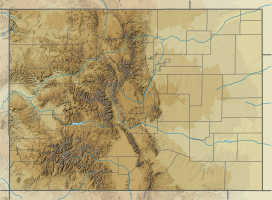Pyramid Peak (Colorado)
| Pyramid Peak | |
|---|---|
 Pyramid Peak as seen from Maroon Peak in 2009 | |
| Highest point | |
| Elevation | 14,025 ft (4,275 m)[1][2] |
| Prominence | 1,638 ft (499 m)[3] |
| Parent peak | Maroon Peak |
| Isolation | 2.09 mi (3.36 km)[3] |
| Listing | Colorado Fourteener 47th |
| Coordinates | 39°04′18″N 106°57′01″W / 39.0716843°N 106.9501651°W[1] |
| Geography | |
| Location | Pitkin County, Colorado, U.S[4] |
| Parent range | Elk Mountains[3] |
| Topo map | USGS 7.5' topographic map Maroon Bells, Colorado |
| Climbing | |
| First ascent | 1909 by Percy Hagerman and Harold Clark |
| Easiest route | Northeast Ridge: Climb, class 4[5] |
Pyramid Peak is a fourteen-thousand-foot mountain in the U.S. state of Colorado. It is the 47th highest mountain peak in Colorado, and 78th highest peak in the United States. It is located in the Elk Mountains in southeastern Pitkin County, approximately 12 miles (19 km) southwest of Aspen. The summit somewhat resembles a ragged square pyramid and is visible from the Roaring Fork River valley north of Aspen along the canyon of Maroon Creek.
Like many of the peaks in the Elks, Pyramid Peak is quite steep, especially compared to more gentle fourteeners such as Mount Elbert. For example, the peak's summit rises 4,000 feet (1,200 m) above Crater Lake to the northwest in only 1.2 miles (1.9 km), and 4,400 feet (1,300 m) above East Maroon Creek to the east of the peak in the same horizontal distance.[6]
Climbing
[edit]
The standard climbing routes on Pyramid Peak are the northeast and northwest ridges (the latter is also known as the "Keyhole Route"). These routes involve difficult route finding (very difficult, in the case of the northwest ridge), high exposure, and a great deal of loose rock. Hence they are two of the most difficult and dangerous of all of the standard routes on the Colorado fourteeners.[7]
Deaths
[edit]In 1988, physicist Heinz Pagels died in a mountain climbing accident on Pyramid Peak, which is located 10 miles to the southwest of the Aspen Center for Physics, where he spent his summers.[8][9]
See also
[edit]References
[edit]- ^ a b "PYRAMID". NGS Data Sheet. National Geodetic Survey, National Oceanic and Atmospheric Administration, United States Department of Commerce. Retrieved October 21, 2014.
- ^ The elevation of Pyramid Peak includes an adjustment of +2.009 m (+6.59 ft) from NGVD 29 to NAVD 88.
- ^ a b c "Pyramid Peak, Colorado". Peakbagger.com. Retrieved October 21, 2014.
- ^ "Pyramid Peak". Geographic Names Information System. United States Geological Survey, United States Department of the Interior. Retrieved November 13, 2014.
- ^ "Pyramid Peak Routes". 14ers.com.
- ^ "Pyramid Peak". TopoQuest. Retrieved 2008-12-01.
- ^
Dawson, Louis W., II (1994). Dawson's Guide to Colorado's Fourteeners. Vol. 1. Blue Clover Press. ISBN 0-9628867-1-8.
{{cite book}}: CS1 maint: multiple names: authors list (link) - ^ Sullivan, Walter (July 26, 1988). "Dr. Heinz Pagels, 49, a Physicist, Dies in Fall From Colorado Peak". The New York Times. Retrieved 28 May 2021.
Staying with Dr. Pagels in Aspen was his wife, the former Elaine Heisey, a professor of religion at Princeton University and an authority on early Christianity ... Heinz Rudolph Pagels was born in New York City on Feb. 19, 1939. He received a Bachelor of Science degree from Princeton University and, in 1965, a doctorate in physics from Stanford University ... Besides his wife, Dr. Pagels is survived by a daughter, Sarah, 2, and an adopted son, David, 3 months old. A son Mark, to whom The Dreams of Reason is dedicated, died in April 1987 at the age of 6.
- ^ Johnson, George (2001-02-20). "A Passion for Physical Realms, Minute and Massive". The New York Times. Retrieved 2023-11-27.
External links
[edit]- "Pyramid Peak". 14ers.com.
- "Pyramid Peak". SummitPost.com. Retrieved 2008-12-01.
- "Pyramid Peak". Distantpeak.com. Retrieved 2008-12-01.
- "Pyramid Peak". Peakware.com. Archived from the original on 2016-03-04. Retrieved 2008-12-01.

